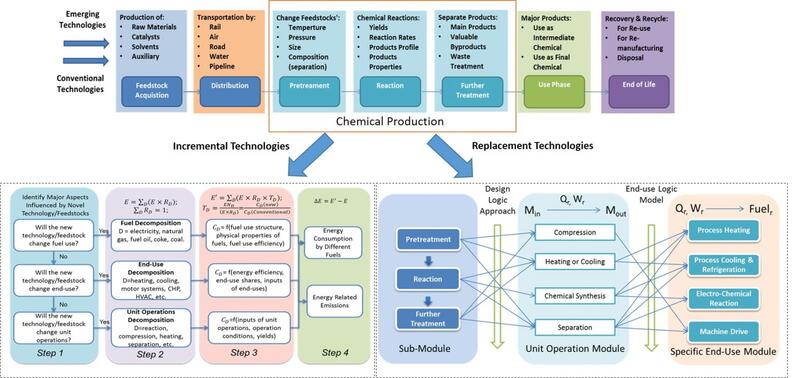Understanding the potential environmental, economic, and societal impacts of emerging technology are critical to support decision making related to fundamental research and technology development. Our group develops innovative modeling frameworks to understand not only the potential impacts of an early-stage technology but also identify drivers of such impacts, aiming to guide the research towards the most robust and sustainable pathway.
New Project: Future Eco Manufacturing of Recyclable Soft Electronics (2022-2025)
This project is an exciting multi-institutional collaboration to develop sustainable soft electronics, sponsored by the U.S. Nationa Science Foundation. Project Summary can be found here.
Identify R&D Priorities for Next-Generation Manufacturing
Life Cycle Assessment (LCA) has been used to assess the environmental implications of emerging technologies in different manufacturing sectors. However, it is challenging to use the traditional LCA method to model the relationships between Life Cycle Inventory (LCI) data and key technical parameters, preventing further analysis for understanding key driving factors and determining priorities for research and technology development. Furthermore, the sensitivity analysis of traditional LCA could be misleading for decision making or strategic planning given that the potential/possibility of improving specific parameters is commonly not taken into consideration. In this work, a novel parametric analysis framework was developed to address the methodological challenge. The modeling framework integrates process-based engineering models with LCA, Life Cycle Cost analysis (LCC), and optimization. The framework is demonstrated through a case study of additive manufacturing (AM).
Yao, Y.* and R. Huang (2019). A Parametric Life Cycle Modeling Framework for Identifying Research Development Priorities of Emerging Technologies: A Case Study of Additive Manufacturing. Procedia CIRP, 80, 370-375.
Generating Energy and Carbon Inventory Data for Emerging Technology in the Chemical Industry
It is a challenging to conduct LCA for emerging technologies due to the lack of inventory data. In this paper, a general and flexible modeling framework was developed to generate inventory data for new technologies in the chemical industry from a life cycle perspective. The modeling framework is applied to emerging technology in the U.S. ethylene industry, ethane oxidative dehydrogenation, for demonstration. Broadly, the work described in this paper provides a decision-support method that can be further used by researchers, environment/energy analysts, and policymakers to evaluate the net benefits of innovative technologies, guide early-stage technology development and investment decisions, and conduct strategic planning for meeting energy and emissions reduction goals of the U.S. chemical industry.
Yao, Y.* and E. Masanet (2018). Life-Cycle Modeling Framework for Generating Energy and Greenhouse Gas Emissions Inventory of Emerging Technologies in the Chemical Industry. Journal of Cleaner Production, 172, 768-777.
